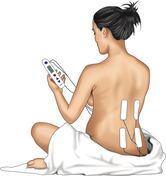It has a BOOST button which gives you a bit stronger sensation during a contraction. It has been used for decades to manage chronic pain conditions, but in recent years, it has gained popularity as a natural pain relief method during labor.
Benefits of a TENS Unit during labor: 1. The Gate Control Theory of pain At the core of the TENS machine lies the Gate Control Theory of pain. According to this theory, the perception of pain can be diminished by stimulating the nerves with pleasant or innocuous impulses. The electrical currents delivered by TENS Units travel to the brain faster than pain signals, effectively closing the "gate" to pain and providing relief during labor. 2. Non-Invasive and Drug-Free One of the most significant advantages of using a TENS unit for labor pain is that it is a non-invasive and drug-free method of pain relief. Unlike medical interventions such as epidural anesthesia, TENS does not involve the use of needles or medication. This makes it a safe option for both the mother and the baby, eliminating concerns about potential side effects. 3. Can Be Used Throughout Labor A remarkable benefit of the TENS machine for labor is its versatility throughout the entire birthing process, starting as early as 37 weeks of pregnancy. Many women find that TENS effectively helps them manage contractions and alleviate back pain without hindering their ability to move around, change positions, or actively participate in pushing during delivery. To maximize the benefits of TENS, it is recommended to start using it in early labor when contractions have established a regular pattern. 4. May Help Reduce the Need for Other Pain Relief Options For women who prefer to avoid or delay medical pain relief interventions, TENS can be an invaluable tool. Research indicates that women who use TENS during labor are less likely to rely on other forms of pain relief, such as epidurals or opioids. By effectively managing pain, TENS offers a natural alternative for women who desire a less intervention-driven birthing experience. 5. Easy to Use TENS units are designed with user-friendliness in mind, allowing the mother or her partner to administer the treatment. The unit consists of a small handheld device that delivers gentle electrical pulses through electrodes attached to the skin. The intensity of the electrical current can be easily adjusted to meet the mother's specific needs and preferences. For instance, if labor intensifies, the 24/7 volume can be adjusted or increased accordingly. 6. No Known Side Effects TENS is widely recognized as a safe and well-tolerated pain relief method, with no known side effects for either the mother or the baby. This makes it an appealing option for women who have concerns about potential risks associated with other forms of pain relief. Furthermore, TENS does not interfere with the monitoring devices used during labor, ensuring the continuous monitoring of vital signs. 7. Cost-Effective In comparison to other pain relief options, TENS is relatively inexpensive. Purchasing or renting a TENS unit is an affordable investment, making it accessible to a wide range of women seeking cost-effective pain management during labor. Its affordability adds to the appeal of TENS as a practical choice for expectant mothers. 8. Disadvantages While the benefits of a TENS unit are significant, it is essential to acknowledge its limitations. They are generally considered to be less potent than epidurals in terms of pain relief, and individual experiences may vary. It's worth noting that while TENS can be a valuable tool in managing labor pain, it should be regarded as one option among many in the pain management toolbox. Similar to the use of music, essential oils, or creating a calm environment, TENS can enhance comfort during childbirth. 9. When NOT to use the TENS As with any pain relief method, there are certain circumstances when TENS should not be used. It is not recommended before 37 weeks of pregnancy or if the skin in the treatment area is inflamed, injured, or displaying a rash. Additionally, women with seizure disorders or those who have a cardiac pacemaker should avoid using TENS units. Just to make sure that there is no risk for you, consult your care provider if you intend to use the TENS. Conclusion In conclusion, a TENS unit designed specifically for labor pain can serve as a safe and useful tool for managing discomfort during childbirth. Its non-invasive nature, lack of medication, ease of use, and absence of known side effects make TENS an appealing choice for women seeking a natural pain relief option. By reducing the need for other forms of pain relief and allowing women to remain mobile and active during labor, TENS units contribute to a more comfortable and positive birthing experience for both the mother and the baby. Comments are closed.
|
AuthorAfter a career as ICU nurse and medical sales representative I followed my passion and became in 2018 a certified birth and postpartum Doula. |
Experience at:
|
CONTACT INFO:
PHONE:
(202) 279 1089 EMAIL:
|

